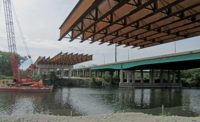 HNTB Inc. |
Rising costs and market volatility are shooting holes in highway construction budgets this spring, forcing contractors to find innovative ways of dodging bullets as they head into summer with many projects in full swing. Steady demand for highway construction is helping to ease contractors’ market anxieties and many say they can afford to carefully pick and choose projects.
“There is so much work going around and not enough contractors to do it,” says Frank Carlile, managing principal at Fort Worth-based Carter & Burgess Inc. “There is not so much competition for work right now, but materials is another story.” The rub is in getting projects to completion amid a minefield of budget pitfalls, and materials prices are one of the biggest.
Nationally, asphalt prices are up about 5% over last year, according to McGraw-Hill Construction Analytics/ENR. However, that follows a 42% increase during 2006 and a 10% hike in 2005. Likewise, concrete prices have been rising about 6% a year since 2005. “It’s much more difficult to make cost estimates than it used to be,” Carlile says.
State transportation departments are reporting a dwindling numbers of bids for contracts. A survey last year by the Federal Highway Administration showed nearly every state transportation department reported a decrease of nearly 50% in the number of bidders per project in the last four years.
It is a challenge Kansas City-based HNTB Inc. faced this year while performing construction management on the $5.3-billion, five-year congestion relief project in Chicago for Illinois State Toll Highway Authority, says Steve Routon, HNTB senior vice president and chairman of construction services.
When the budget on a portion of the program got sucker-punched by materials price spikes, which Routon attributes to the “sheer volume of construction in Chicago,” HNTB stepped back and regrouped. “We changed our approach,” Routon says. Breaking the program down into smaller, more numerous projects shortened time frames, eased contractors’ cost fears and attracted more bids. Packaged as $100-million contracts, projects “did not attract enough competition,” Routon says. “But contracts in the $50-million range opened it up to smaller contractors.”
Price volatility was a speed bump on a major bypass project in North Carolina this year, where the design-build team of Long Beach, Calif.-based Earth Tech Inc., Longmont, Colo.-based Flatiron Constructors Inc. and United Contractors Inc., Chester, S.C., are constructing a 6.8-mile bypass and 2.8-mile crossing over the Tar River wetlands.
“This job will take a hit,” says Wally Jordan, program manager for Earth Tech on the $192-million U.S. 17 Bypass project in Washington, N.C. Earth Tech has design responsibility for the joint venture. After winning the contract “prices for steel post-tensioning bars rose to three times higher than the price given at bid,” Jordan says. “We had to approach (North Carolina Dept. of Transportation) with a value engineering solution.”
Earth Tech went back and redesigned the project, substituting steel post-tensioning bars with seven-wire strand. “We had to eliminate 200 cross frames from the design but we were able to save $2.5 million to $3.5 million by making that change,” says Jordan. The delay added about three months to the design phase. “We are burning the candle at both ends,” he says.
Many contractors report that suppliers who once offered 100-day price quotes now commit only to 30- to 60-day quotes on prices for key materials such as cement and asphalt. “Suppliers will not hold their price anymore,” Jordan says.
Many overruns on projects are related to time frames, Routon says. “In the old days, contractors typically had a no-damage-for-delay clause,” he says. “But today contractors have to find ways to make a profit despite delays.”
Contractors mention labor costs right alongside prices of fuel and materials as market factors. The highway market is particularly hard-hit by the shortage of skilled workers and managers, says Bill Burnett, vice president of project development at J.D. Abrams LP, Austin, Texas.
“Petrochemical contractors can offer higher wages for senior estimators and managers than we can,” says Burnett, “But we have to do the same if we are to compete.” To compensate, “some contractors in the highway market are hiring less skilled people,” says Routon.
State transportation officials are adopting various tactics to keep projects moving forward despite costs. Some offer fuel price escalation clauses for contractors and others give contractors flexible start dates within a 90-day period.
“They are looking for delivery methods to get to construction faster,” says Routon. As a result, integrated delivery is an antidote to cost volatility for many state transportation departments, which are increasingly turning to design-build. Still, “there is no silver bullet,” he adds.
 Related Links:
Related Links: 
